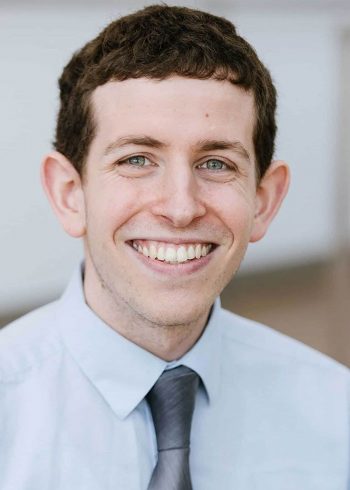Blog
Meet Dr. Adam Mayer: Fellow Physician in Adult and Pediatric Rheumatology at UPenn

Adam Mayer, MD, discovered his love for rheumatology in his first year of residency after having several meaningful and exciting patient cases with systemic rheumatic diseases. He has always wanted to care for the most complex and critically ill patients and vasculitis was a natural interest.
Dr. Mayer began his four-year fellowship at the University of Pennsylvania (UPenn) Department of Rheumatology and the Children’s Hospital of Philadelphia (CHOP) Department of Pediatric Rheumatology in July 2021. The fellowship is comprised of two clinical years (one pediatric and one adult) as well as two research years. During his fellowship training, he also will be pursuing a Master of Science in Clinical Epidemiology (MSCE) at UPenn with a plan to conduct his MSCE thesis on outcomes in inflammatory bowel disease (IBD) and IBD-associated arthritis.
At the end of his first year of residency, Dr. Mayer began working with Rennie Rhee, MD, MSCE, in her research regarding patients with incidentally discovered aortitis (inflammation of the aorta) after surgical repair. “I found it fascinating that patients could have significant inflammation in a major blood vessel in the body without having any symptoms,” he said. That research and Dr. Rhee’s mentorship have strengthened Dr. Mayer’s interest in clinical research in the field of rheumatology. Dr. Rhee is a rheumatologist and Assistant Professor of Medicine at the Hospital of UPenn. She was a Vasculitis Foundation fellow in 2014.
Dr. Mayer trained as an internal medicine/pediatrics physician and his interest for clinical research lies in both adult and pediatric rheumatology. “I’m interested in how certain rheumatic diseases can manifest very differently in adults versus children, and how and why certain rheumatic diseases occur exclusively in certain age groups,” he added.
Over the course of his four years of medical school and four-year residency training, Dr. Mayer came to love Philadelphia as his new home and the UPenn/CHOP medical systems as extraordinary institutions. “There’s an incredible breadth of disease pathology that provides for rigorous training as a clinical rheumatologist,” Dr. Mayer explained. “In addition, there’s a wide array of resources and mentorship opportunities to facilitate my continued growth as a future clinical researcher.”
Dr. Mayer has worked on a couple of projects with Dr. Rhee related to incidentally discovered aortitis. The research focused on patients who have had surgical aortic aneurysm repair and, while exhibiting and reporting no pre-surgical inflammatory symptoms, they are found to have aortic inflammation on close review by pathologists. “The first part of our work was a case-control study looking at risk factors prior to surgery that may suggest that a certain patient could have underlying aortitis,” Dr. Mayer said. “The goal was to identify higher risk patients who might benefit from being seen by a rheumatologist prior to surgery to evaluate for possible vasculitis.” They found that older female patients without a history of coronary artery disease were more likely to have underlying aortitis. As such, these patients may benefit from rheumatologic evaluation prior to surgery.
The second project, for which Dr. Mayer was lead author, centered on immediate post-operative and longer term outcomes in this aortitis patient population. “The goal was to see if patients with aortitis have any more surgical risk than patients without underlying aortitis when undergoing aneurysm repair,” he said. “In addition, we sought to evaluate longer term clinical outcomes (such as the need for surgical revision) and radiographic outcomes (such as new aneurysm formation and other new or worsening vascular abnormalities on imaging) to better understand how to monitor this population after surgery, whether serial imaging is necessary, and whether a rheumatologist should be involved in the patients’ ongoing care. The manuscript with our findings is currently undergoing final revisions prior to publication.”
Through his fellowship training, Dr. Mayer hopes to develop clinical expertise in both pediatric and adult rheumatology with the ultimate goal of independently caring for patients of any age with rheumatic disease. “I also hope to help facilitate more streamlined transition of care for children with chronic rheumatic disease as they conclude their teenage years and move from pediatric to adult rheumatic care.” With the experience he gains through his MSCE studies and work with his mentorship team, Dr. Mayer also wants to develop the skills to conduct future clinical research studies successfully and independently in his areas of interest in vasculitis and spondyloarthritis.
In the remaining three years of his fellowship, Dr. Mayer will continue working with Dr. Rhee on a project looking at the role of the microbiome in vasculitis. He also plans on collaborating with Jessica Bloom, MD, MSCS, from the University of Colorado to help characterize eosinophilic granulomatosis with polyangiitis in children. Dr. Bloom is currently a Vasculitis Clinical Research Consortium-Vasculitis Foundation fellow.
“Most importantly,” Dr. Mayer added, “I respect, admire, and appreciate my colleagues and mentors at UPenn/CHOP. Everyone I have worked with clinically and academically is incredibly gifted but also down-to-earth and relatable.” He is surrounded by brilliant physicians he enjoys working with, who teach him new things every day. He feels very privileged to be at an institution where his work is rewarding.






